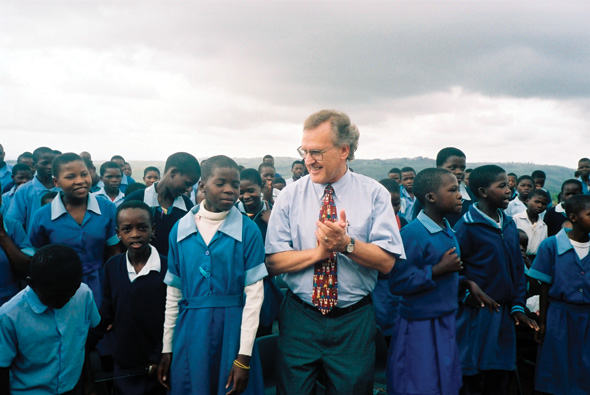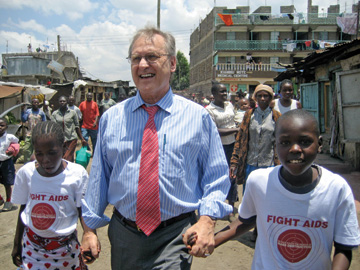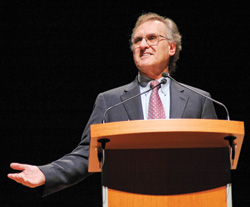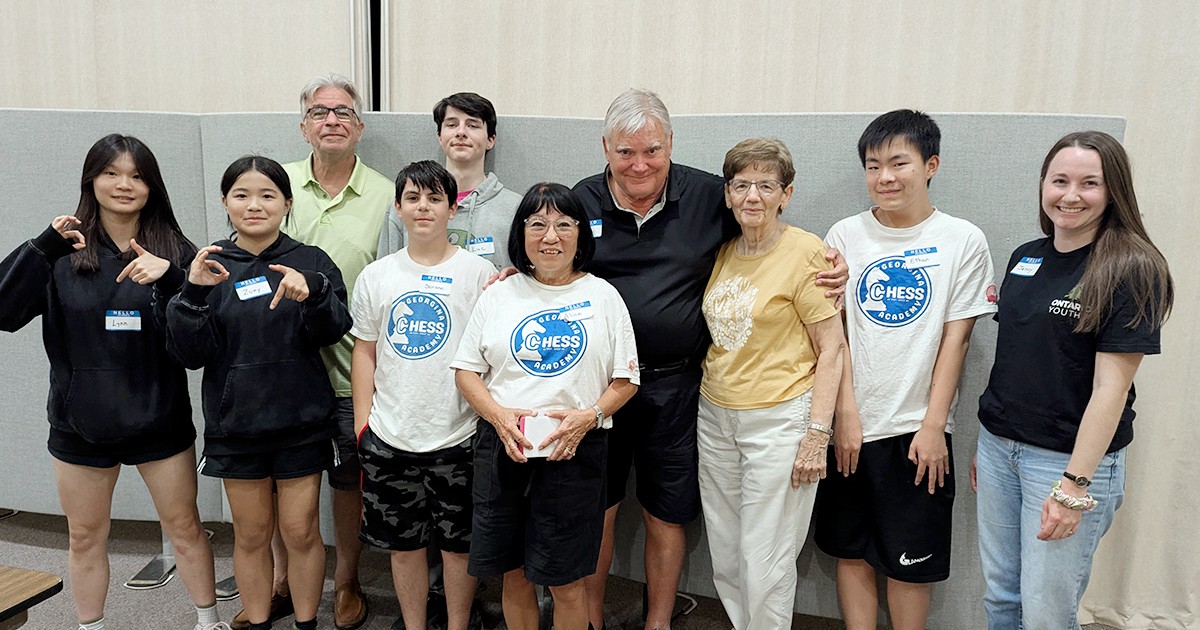 The statistics are sobering and almost impossible to comprehend. Around the world, there are 33 million people living with the HIV-AIDS virus—almost 24 million of them in Africa alone—and more than 25 million people have already died. For every person put into treatment, there are two new infections, so the crisis is outstripping the world's capacity to respond. It's been referred to as the worst pandemic in modern history.
The statistics are sobering and almost impossible to comprehend. Around the world, there are 33 million people living with the HIV-AIDS virus—almost 24 million of them in Africa alone—and more than 25 million people have already died. For every person put into treatment, there are two new infections, so the crisis is outstripping the world's capacity to respond. It's been referred to as the worst pandemic in modern history.
For more than two decades, Stephen Lewis has worked with the United Nations to combat this dreaded disease. From 1995 to 1999, he was the deputy executive director of UNICEF and from 2001 to 2006, he was the U.N. Secretary-General's special envoy for HIV-AIDS in Africa. Now a distinguished visiting professor at Ryerson University in Toronto, he is the co-founder and co-director of AIDS-Free World and the board chair of the Stephen Lewis Foundation (www.stephenlewisfoundation.org), which is dedicated to turning the tide of HIV-AIDS in Africa.
Salvationist recently interviewed Stephen Lewis in Toronto.
How familiar are you with the work of The Salvation Army?
For me, the experience of The Salvation Army has been frequently on the ground in Africa, dealing with the pandemic of HIV-AIDS. The work of the Army in Africa is quite extraordinary—in the villages, the hospitals and the health centres—and they get the job done. The Salvation Army's Howard Hospital in Zimbabwe, for instance, is one of the best hospitals in the country dealing with HIV-AIDS. You can't imagine the contribution the Army has made to reducing the HIV-AIDS rates in Zimbabwe. There, as elsewhere, the Army functions at the grassroots and community level.
What is the greatest challenge Western governments face in terms of AIDS?
Resources. There's just no question that we're on the cusp of defeating the pandemic. We know how to do it, we have the drugs to prolong life, we know more and more about prevention, and we have hope for a vaccine.
A breakthrough is possible, but the resources are drying up at precisely the moment we need them most, and that's a criminal delinquency on the part of the West.
If we're on the verge of a breakthrough, what more needs to be done?
We need the donor countries to do for public health what they do for everything else. There are trillions of dollars available to bail out banks, for stimulus packages, to fight wars in Afghanistan and Iraq, and deal with terrorism and oil spills, but there's never even a microscopic portion of that available for global public health. And that's the tragedy, that the priorities are so wrong, that human beings are so expendable in the midst of the financial crisis.
Does it all come down to more money?
It's not that money is the only answer. We know how to train people, we know how to improve infrastructure, we know what drugs are effective. We even know a lot about prevention, education, male circumcision and so on.
But none of that is possible without help. Africa is a continent of a billion people, 700 million of whom live on less than a dollar a day. How can they possibly manage if there isn't some sort of continuing help?

What is the role of faith-based organizations in the fight against AIDS?
Faith-based organizations are primarily effective at the community level, working with community health workers who care for those living with AIDS and orphaned children—16.6 million orphans live in sub-Saharan Africa alone—making sure people get their drugs and adhere to the regimen. All of these things are what faith-based organizations do so well and that's why they have a role to play.
The Salvation Army is concentrating its efforts on community-based approaches. Is this an effective strategy in your eyes?
Without being a romantic about it, it's the community-based interventions that will one day turn the pandemic around. Obtaining the billions and billions of dollars for the drugs, the infrastructure, the training and the prevention is important. But at the grassroots where people live and die, where the struggle for survival is most intense, that's where The Salvation Army comes into play, where they give people hope and support.
That's key because the strength at the community level is much greater than anyone in the Western world appreciates. There's tremendous intelligence and sophistication at the local level in Africa but it is not widely acknowledged.
If you had one thing to say to our Salvationist readers, what would it be?
That it's important to understand the extraordinary work the Army does in Canada dealing with poverty, hunger, the homeless and battered women. These are the groups of vulnerable individuals who really rely on your compassion, decency and resources to get through life, day after day.
But what's extremely important for your readers to understand is that The Salvation Army is in 122 countries and what you do around the world is equally important. Therefore, when you're supporting the Army in Canada, by extension, you're supporting its work everywhere, and that's invaluable.
Why are you so committed to the struggle against AIDS?
How can I be so self-indulgent as to worry about my own place in this planet when there are people struggling for survival? I want to be part of that struggle.
What has been your greatest accomplishment in this fight?
I think it's just being able to be a voice, being able to be an advocate on the issues that don't normally get dealt with openly in the U.N. system. I was given an opportunity to speak boldly and unequivocally in the U.N. It bothered a lot of people, frankly, but it was a tremendous opportunity to have the issues aired. What I feel best about is just having been an advocate.
"Who Will Rescue Them?

Excerpts from a speech given by Stephen Lewis in November at the annual Salvation Army Hope in the City breakfast in Toronto:
It's important and appropriate that The Salvation Army, which does such a remarkable job in responding to the frailties of the human condition, understands its tremendous contribution to society. It's intense, heartfelt, humanitarian and decent.
I recently read a newspaper report stating that child poverty increased by 15 percent between 2008 and 2009. How is it possible that we have so many children living below the poverty line? How can it be adequately explained? How can we live in a society which, by and large, has a great deal of privilege and opportunity yet still consigns so many people to lives of desperation?
Who rescues them? Who shows compassion? Who is there when so much is needed? We turn and we find The Salvation Army.
Driven by deep and profound religious and spiritual instincts, The Salvation Army is always there in a society that, let's face it, is struggling and will struggle more in the next year or two as we attempt to rebound from economic hardship. I'm glad to have the opportunity to acknowledge the extraordinary work that is being done here in the city, in the province and in the country.
I may be on the other side of the Judeo-Christian equation, but I'm sure the prophets would approve of you!









Comment
On Thursday, February 24, 2011, Rob Jeffery said:
Leave a Comment